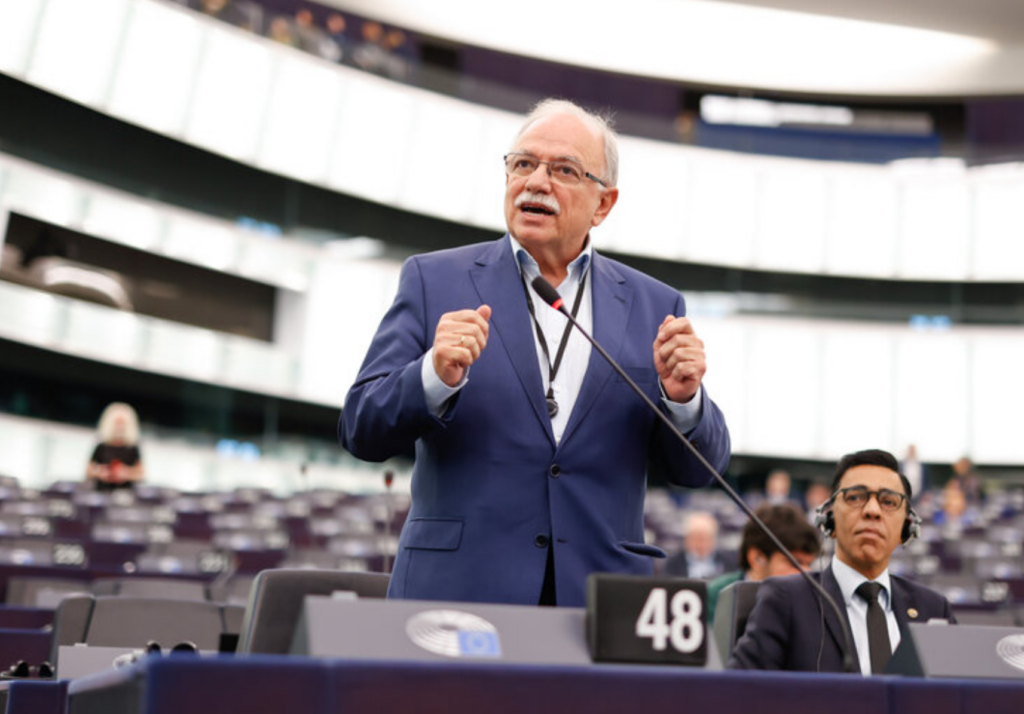A senior European official has expressed profound scepticism as to whether EU funds earmarked for Ukraine are being used as officially intended, and noted that he is deeply concerned by the prospect that some of the aid is instead being illicitly siphoned off by lobbyists or corrupt government officials.
"I am very much worried about that money [from the EU] going to EU officials or lobbyists or Ukrainian officials," Greek Vice-President of the European Parliament and Head of the Syriza Delegation Dimitrios Papadimoulis told The Brussels Times. "I have a lot of doubts if the money and the support is going to places and the people who want or need that support. [I am worried] that part of it goes to other places and to other pockets."
According to data provided by the European Commission, the EU has mobilised €67 billion in humanitarian, economic, and military support to Ukraine since Russia launched its full-scale invasion in February last year.
Ukraine is currently ranked 122 out of 180 countries on Transparency International's Corruption Perceptions Index — a position it shares with Eswatini (formerly known as Swaziland). It ranks below Sierra Leone (115), Brazil (96), and Belarus (82), among numerous other countries.
Papadimoulis' comments also come against the backdrop of a recent corruption scandal at the European Parliament, in which senior EU officials are alleged to have received bribes from the Qatari and Moroccan Governments in exchange for supporting pro-Qatari and pro-Moroccan legislation.
Papadimoulis has previously suggested that the so-called Qatargate scandal merely represents "the tip of the iceberg" of more deeply entrenched European corruption.
Cosmetic changes?
To further substantiate his concerns, Papadimoulis alluded to a recent high-profile corruption scandal involving purchases of overpriced military supplies by senior members of the Ukrainian Government. The scandal led to the resignation or dismissal of four Deputy Ministers and five Governors, including Deputy Head of the Office of the President Kyrylo Tymoshenko and Deputy Defence Minister Vyacheslav Shapovalov.
During the interview, Papadimoulis stated that he was uncertain as to whether the cabinet reshuffle implemented by Ukrainian President Volodymyr Zelenskyy in response to the scandal represented a substantive or merely cosmetic change.
"Some weeks ago, Zelenskyy was obliged to make some changes, but I don't know if it was a real change or if it was just an effort to show that something is happening," Papadimoulis said. "We must maintain solidarity with the Ukrainian people, but we must also ensure transparency and that the money for their assistance goes where it is needed."
Papadimoulis' assessment of the affair differs markedly from that of European Commission President Ursula von der Leyen. The EU chief previously suggested that the scandal, rather than constituting a cause for concern, in fact provides evidence that Ukraine is undertaking serious efforts to combat corruption.
"I'm comforted to see that your anti-corruption bodies are on alert and effective in detecting corruption cases," von der Leyen said, speaking directly to Zelenskyy at a joint press conference held in Kyiv in February. "I commend you on reacting so rapidly at the political level to make sure that the fight against corruption is delivering tangible results and is further stepped up."
A 'pro-Putin' narrative?
Asked to comment on Papadimoulis' remarks, Estonian MEP and Vice-Chair of the Committee on Foreign Affairs Urmas Paet (Renew Europe) cited a study conducted by Novaya-Europe, a summary of which was recently published by EUobserver.
"According to the study, MEP Papadimoulis' party Syriza is one of the leading 'pro-Putin' parties in the European Parliament," Paet said. "When analysing the comments made by MEPs, it is important to take into account their voting patterns in order to have a better understanding why they are saying what they are saying."
Paet added that he does "not have any information about the abuse of EU support in Ukraine", but stressed that "the result of this war will be decided on the battlefield and thus giving especially military aid [to Ukraine] is of key importance".
Related News
- 'Tip of the iceberg': Qatargate mere symptom of deeper corruption, claims senior EU official
- EU steps up its fight against Russia’s manipulation of information about the war in Ukraine
While declining to comment specifically on Papadimoulis' remarks, a spokesperson for the European Commission similarly noted that the EU "has put in place a comprehensive framework for ensuring sound financial management of its external assistance programmes".
"The EU Delegation in Kiev ensures a regular monitoring on the ground, which is complemented by external audits and ex post controls by the Commission. And of course, in case of suspicions of fraud, the Commission passes information to European Anti-Fraud Office (OLAF)," the spokesperson added.

